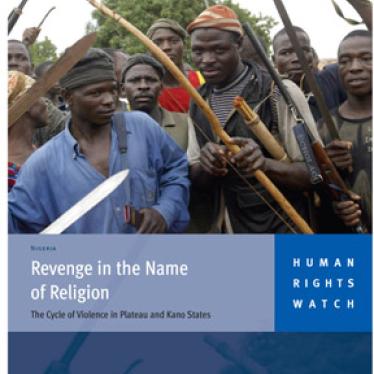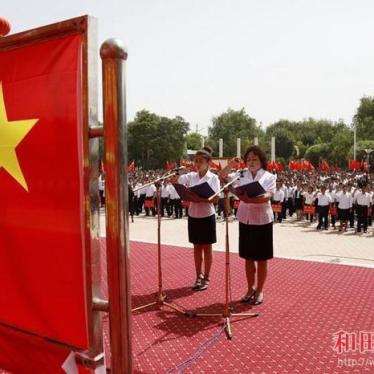(London, May 25, 2005) - One year after some 900 people were massacred in clashes between Muslims and Christians in northern and central Nigeria, the Nigerian government has failed to prosecute those responsible for this cycle of violence, Human Rights Watch said in a report released today.
The 75-page report, “Revenge in the Name of Religion: The Cycle of Violence in Plateau and Kano States,” provides the first detailed analysis of these incidents and the factors that continue to threaten the stability of central and northern Nigeria. It provides detailed documentation of two major outbreaks of violence in the town of Yelwa, Plateau State, in February and May 2004, and a reprisal attack in the northern city of Kano in May 2004.
In the central region that lies between the mainly Muslim north and largely Christian south, armed Muslims on February 24, 2004 killed more than 75 Christians in the town of Yelwa, at least 48 of them inside a church compound. Then on May 2 and 3, hundreds of well-armed Christians surrounded the town from different directions and killed around 700 Muslims. They also abducted scores of women, some of whom were raped. Both attacks were well-organized, and in both instances, the victims were targeted on the basis of their religion.
One week later, reacting to reports of the Yelwa attacks, Muslims in the northern city of Kano on May 11 and 12 turned against Christian residents of the city, killing more than 200. In addition, police and soldiers deployed to restore order in Kano carried out dozens of extrajudicial killings themselves. The victims included people who, according to eyewitnesses, were not even involved in the violence.
“The Nigerian government bears a heavy responsibility for the massive loss of life in these eruptions of violence fueled by religion,” said Peter Takirambudde, director of Human Rights Watch’s Africa Division. “The security forces were absent while hundreds of people were being massacred in Yelwa. Instead of protecting those at risk and trying to arrest the perpetrators, police and soldiers shot people on sight in Kano.”
There have been numerous other incidents in Plateau State over the last four years, starting with the outbreak of violence in city of Jos in September 2001, in which around 1,000 people were killed in less than a week. In 2002 and 2003, violence spread to other parts of the state. Human Rights Watch estimates that between 2,000 and 3,000 people have died in communal violence in Plateau State since 2001.
“The warning signs were there for a long time,” said Takirambudde. “But the government chose to do nothing until the situation spiraled out of the control.”
Some two weeks after the massacre in Yelwa, President Olusegun Obasanjo declared a state of emergency in Plateau State on May 18, 2004, and suspended the state governor. An interim administrator launched an ambitious peace program, and relative calm was restored.
Six months later, in November, the state of emergency was lifted, but the peace program appears to have stalled. Various initiatives proposed under the state of emergency – notably a truth and reconciliation commission – have not been implemented. Dozens of people have been arrested, but those responsible for planning and organizing the violence have still not been prosecuted. Neither have the police or soldiers responsible for the killings in Kano.
“The government needs to do much more to ensure lasting peace in the affected areas,” said Takirambudde. “The authorities need to send a clear message that those responsible for these killings will be arrested and prosecuted. The impunity protecting the perpetrators has only encouraged further violence.”
The report provides background information on the causes of the violence in Plateau State and explains how a localized dispute between ethnic groups competing for political control, land and economic resources turned into a fully fledged religious conflict, extending well beyond the boundaries of the state.
“Both Muslims and Christians have realized that religion is an extremely effective way of mobilizing large numbers of people,” said Takirambudde. “Local leaders on both sides have cynically manipulated religion with disastrous consequences.”
At the heart of the conflict is the distinction between “indigenes” — people who consider themselves as the original inhabitants of an area — and those whom they view as “settlers.” The concept of “indigeneship” has been exploited and used to discriminate against those termed as “settlers.”
“The Nigerian government needs to remove the distinction between ‘indigenes’ and ‘settlers’,” said Takirambudde. “As long as this distinction is given official recognition, the potential for further conflict remains.”
Human Rights Watch urged the Nigerian government to seize the opportunity of the current calm in Plateau and Kano states to implement a number of other measures aimed at preventing a recurrence of the conflict. In particular, Nigerian authorities should identify and bring to justice those who organized and planned the violence, and should ensure the timely deployment of an adequate security force presence in areas of tension, while ensuring that members of the security forces do not carry out abuses themselves.







